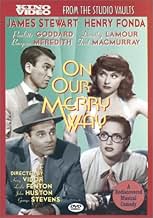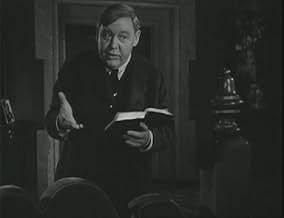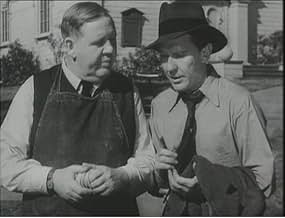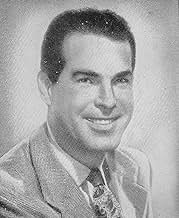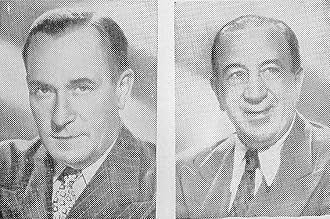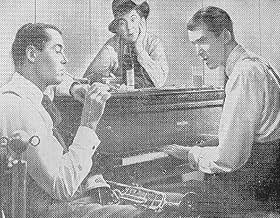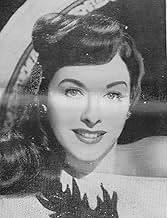CALIFICACIÓN DE IMDb
5.7/10
934
TU CALIFICACIÓN
Agrega una trama en tu idiomaThree short stories revolving around the topic of the daily question posed by the roving reporter to the readers of a daily newspaper.Three short stories revolving around the topic of the daily question posed by the roving reporter to the readers of a daily newspaper.Three short stories revolving around the topic of the daily question posed by the roving reporter to the readers of a daily newspaper.
Carl 'Alfalfa' Switzer
- Leopold 'Zoot' Wirtz
- (as Carl Switzer)
Opiniones destacadas
Before I committed to buying the DVD of "On Our Merry Way," I got it from Netflix and happy I am that I did so, for it's not likely I'd ever want to watch it again. "On Our Merry Way" is an anthology film in the manner of "O. Henry's Full House," but while the latter has a no-nonsense framework with John Steinbeck introducing the episodes, "On Our Merry Way" uses the gimmick of Burgess Meredith talking directly to the camera every so often. It doesn't work; it seems more like a vanity project for Meredith and his then wife Paulette Goddard.
Nor do the stories work. They are shaggy dog stories that bore you long before they reach a conclusion. The Henry Fonda-James Stewart and Fred MacMurray-William Demarest episodes are simply not funny. "On Our Merry Way" is full of overacting (especially from Carl "Alfalfa" Switzer) and shtick (from Victor Moore and Hugh Herbert). Dorothy Lamour, on the other hand,comes off extremely well both as an addle-pated secretary and then with a song that satirizes her own career; for Lamour it's a triumph over inferior material.
John O'Hara is credited for one of the stories, O. Henry is not, even though his "The Ransom of Red Chief" serves as the basis for the MacMurray-Demarest episode; for comparison, watch the Fred Allen-Oscar Levant take on the same story in "O. Henry's Full House." It's only minimally better but it moves faster.
It's inconceivable to me that so many great directors, credited or un-, would produce such a mess.
One can't help be grateful to Kino for clearing the copyright problems which had long kept the film in limbo; after all, we do want to preserve the work of our great stars, no matter how bad. But once our curiosity is satisfied, "On Our Merry Way" becomes a shelve-it-and-forget-it film.
For a much better pairing of Meredith and Goddard, I'd recommend Jean Renoir's English-language version of "The Diary of a Chambermaid."
Nor do the stories work. They are shaggy dog stories that bore you long before they reach a conclusion. The Henry Fonda-James Stewart and Fred MacMurray-William Demarest episodes are simply not funny. "On Our Merry Way" is full of overacting (especially from Carl "Alfalfa" Switzer) and shtick (from Victor Moore and Hugh Herbert). Dorothy Lamour, on the other hand,comes off extremely well both as an addle-pated secretary and then with a song that satirizes her own career; for Lamour it's a triumph over inferior material.
John O'Hara is credited for one of the stories, O. Henry is not, even though his "The Ransom of Red Chief" serves as the basis for the MacMurray-Demarest episode; for comparison, watch the Fred Allen-Oscar Levant take on the same story in "O. Henry's Full House." It's only minimally better but it moves faster.
It's inconceivable to me that so many great directors, credited or un-, would produce such a mess.
One can't help be grateful to Kino for clearing the copyright problems which had long kept the film in limbo; after all, we do want to preserve the work of our great stars, no matter how bad. But once our curiosity is satisfied, "On Our Merry Way" becomes a shelve-it-and-forget-it film.
For a much better pairing of Meredith and Goddard, I'd recommend Jean Renoir's English-language version of "The Diary of a Chambermaid."
This odd, freewheeling, independently-made compendium film emerges as little more than a glorified home movie (despite the considerable talent involved) but is certainly watchable and entertaining in itself. The linking narrative revolves around married couple Burgess Meredith and Paulette Goddard (at the time hitched in real life): she's an artist and he a lowly employee with a newspaper aspiring to be a journalist; while attempting to flee a creditor, he meets and interviews a number of people about the influence of children in their lives.
The three 'stories' are quite nice with all the various performers contributing generous and relaxed cameos: the first concerns down-and-out musicians Henry Fonda and James Stewart and their involvement in an instrumental contest taking place in a small town (they're all too ready to appease the mayor who has promised them a lot of money if his son is allowed to win but, thanks to the intervention of trumpeter Harry James, a multi-talented girl emerges the clear winner and eventually becomes the owner of Fonda and Stewart's band!); the second finds Dorothy Lamour parodying her former image of a sarong girl (she's a bit player whose opportunity for stardom finally arises out of a disastrous stint in a vehicle for a spoilt child star); the last story, reminiscent of O. Henry's "The Ransom Of Red Chief" (later filmed by Howard Hawks), involves ex-con magician Fred MacMurray and how he and his partner William Demarest stumble upon a boy in the woods and are continually outwitted by him (he's actually fleeing from his eccentric banker uncle but MacMurray eventually discovers his true identity and, in the end, the boy and his elder sister join in on the magic act).
The three 'stories' are quite nice with all the various performers contributing generous and relaxed cameos: the first concerns down-and-out musicians Henry Fonda and James Stewart and their involvement in an instrumental contest taking place in a small town (they're all too ready to appease the mayor who has promised them a lot of money if his son is allowed to win but, thanks to the intervention of trumpeter Harry James, a multi-talented girl emerges the clear winner and eventually becomes the owner of Fonda and Stewart's band!); the second finds Dorothy Lamour parodying her former image of a sarong girl (she's a bit player whose opportunity for stardom finally arises out of a disastrous stint in a vehicle for a spoilt child star); the last story, reminiscent of O. Henry's "The Ransom Of Red Chief" (later filmed by Howard Hawks), involves ex-con magician Fred MacMurray and how he and his partner William Demarest stumble upon a boy in the woods and are continually outwitted by him (he's actually fleeing from his eccentric banker uncle but MacMurray eventually discovers his true identity and, in the end, the boy and his elder sister join in on the magic act).
Interesting story that doesn't know where it wants to go - I won't be as harsh on this film as other posters. That's perhaps because I know a little about the personal lives of two of it's stars, Burgess Meredith and Paulette Goddard. I just watched this on Kino's DVD. It's one of those rare films with multiple directors and long thought lost. Burgess Meredith and Paulette Goddard get things started for us n the opening and make a cute couple(they were married in real life at the time) and she calls him Oliver, Meredith's real life first name. Meredith plays a newspaper guy and for some reason asks the question "has a child made a difference in your life?" He is IMO trying to get an answer to make something tick for his newspaper article and/or for personal reasons ??. Though this is a scripted film the question, one get's the feeling, is a personal one for Meredith and Goddard, for in real life in 1944 Goddard suffered a miscarriage of their child, probably devastating to both of them. Unless you know that bit of trivia you won't pay but fleeting attention to the conversation between Burgess and Paulette. As stated in the summary this film has to be one of the first motion pictures to show a husband and wife sleeping together in the same bed, which is impressive considering the Breen Production Code in effect at the time. Married couples however would continue to sleep in twin beds until TV shows like The Brady Bunch in the late 1960s. The film pairs off into too many directions first with James Stewart and Henry Fonda, then with Fred MacMurray and William Demarest. Stewart and Fonda were friends in real life and that holds something for fans of the pair but their story is aimless. The duo put on a variety show reminiscent of today's American Idol. MacMurray and Demarest would famously work together again in the mid 60s on My Three Sons, after Demarest replaced William Frawley who became ill and died. MacMurray and Demarest have their comic moments especially with a precocious(in a bad way) little boy called "Sniffles". Demarest is too old for the kind of physical slapstick he's subjected to here. All in all another aimless scene. Dorothy Lamour shows up as a cutie who later dons a sarong in a musical revue. A voluptuous piece of cheesecake, famous for playing the island girl in the Crosby-Hope 'Road' pictures, her stay is all too short. This film should have stayed focused on the interesting beginnings with Meredith and Goddard. Meredith himself is not involved enough in the linking stories to make the finale cohesive. He finds what ever answer/lesson he's looking for but the audience has been shuttled from one minor point to the next. Paulette at the close of the film reveals that she's pregnant(only in the story) and she and Meredith rejoice at end. Their story should have been the main focus of the film and dare the subject of talking about pregnancy which I get at the conclusion that that's what the story was about. Instead we're taken from one inconsequential story to the next without logical tie-in to Meredith and Goddard. That's why I think so many people miss the point and poo-poo the film. But if you know the different junctures of the film especially the part with Burgess Meredith and Paulette Goddard you should be able to enjoy the picture.
And then just sinks into boredom.
Martha Pease (Paulette Goddard) demands that her husband Oliver (Burgess Meredith) tell the newspaper where he works as the "Roving Reporter" that he be allowed to pick his own subjects. She will know if he did that by reading the next edition's Rambling Reporter column and seeing that his idea - How has a small child influenced your life? - is the theme of the column.
After leaving his apartment that morning Oliver confesses to the audience that he is not the Roving Reporter. He is in fact just a classified ad clerk, but that he told his wife this lie before they were married and hasn't had the heart to tell her the truth ever since. As a result he has been lying about his salary and thus he is in peril of having his furniture repossessed and he owes gambling debts. This is all very interesting, but then it just bogs down. And that is hard to believe when one of the vignettes involving people on the street actually being interviewed includes James Stewart and Henry Fonda, good friends in real life, on screen together.
When I first sat down to watch this I wondered why I had never heard of this one. By the time it finished I knew the answer to that question. Avoid.
Martha Pease (Paulette Goddard) demands that her husband Oliver (Burgess Meredith) tell the newspaper where he works as the "Roving Reporter" that he be allowed to pick his own subjects. She will know if he did that by reading the next edition's Rambling Reporter column and seeing that his idea - How has a small child influenced your life? - is the theme of the column.
After leaving his apartment that morning Oliver confesses to the audience that he is not the Roving Reporter. He is in fact just a classified ad clerk, but that he told his wife this lie before they were married and hasn't had the heart to tell her the truth ever since. As a result he has been lying about his salary and thus he is in peril of having his furniture repossessed and he owes gambling debts. This is all very interesting, but then it just bogs down. And that is hard to believe when one of the vignettes involving people on the street actually being interviewed includes James Stewart and Henry Fonda, good friends in real life, on screen together.
When I first sat down to watch this I wondered why I had never heard of this one. By the time it finished I knew the answer to that question. Avoid.
Not the "rediscovered gem from the Golden Age of Cinema" as it is proclaimed on the Kino Video DVD case, but a curiosity nonetheless. It is an anthology movie with four different stories tied together by a young Burgess Meredith asking the question "How has a child influenced your life?" The most successful sequence (directed by the unbilled John Huston & George Stevens) involves James Stewart and Henry Fonda as a couple of down-on-their-luck musicians. Not only is it great to see these two real-life pals work together for the first time, but their chemistry & easy slapstick antics are quite funny. Seeing Henry Fonda playing the trumpet while gradually getting seasick, and taking Carl "Alfalfa" Switzer down with him, is worth the whole movie. I guess the copyright on O. Henry's "The Ransom of Red Chief" had expired as the Fred MacMurray, William Demerest sequence (years before they were teamed again on T.V.'s "My Three Sons") is a blatant and not very inspired rip-off.
¿Sabías que…?
- Trivia"A Miracle Can Happen" was the original title of this film when released on Feb. 3, 1948 at the Warner Theater in Manhattan. It consisted of three short stories (about 20-25 minutes each) linked by the Burgess Meredith character. He played a reporter looking for a good scoop, and in the second sequence, Charles Laughton played a bible-reading minister. When it was released nationally in June, however, it had been decided that the religious story would be dropped and replaced by a more comic one featuring Dorothy Lamour. The film in this new version was then re-titled "On Our Merry Way". However, prints of the original film had already been sent abroad for dubbing. In Spain, "A Miracle Can Happen" became "Una Encuesta Llamada Milagro", complete with the original Laughton sequence intact (but without the alternative Lamour story). As it has been released on DVD there and retains the English-language soundtrack, the movie can be seen as it was originally intended.
- Versiones alternativasThe version released in Spain and always seen on both TV and DVD, in dubbed and subtitled versions (bearing the title card "A Miracle Can Happen"), includes the Charles Laughton episode but not the Dorothy Lamour one.
- ConexionesFeatured in Henry Fonda: The Man and His Movies (1982)
Selecciones populares
Inicia sesión para calificar y agrega a la lista de videos para obtener recomendaciones personalizadas
- How long is On Our Merry Way?Con tecnología de Alexa
Detalles
- Tiempo de ejecución1 hora 47 minutos
- Color
- Relación de aspecto
- 1.37 : 1
Contribuir a esta página
Sugiere una edición o agrega el contenido que falta

Principales brechas de datos
By what name was Por nuestro alegre camino (1948) officially released in India in English?
Responda
